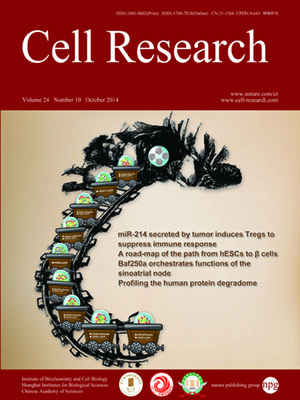
Volume 24, No 10, Oct 2014
ISSN: 1001-0602
EISSN: 1748-7838 2018
impact factor 17.848*
(Clarivate Analytics, 2019)
Volume 24 Issue 10, October 2014: 1214-1230
ORIGINAL ARTICLES
Profiling human protein degradome delineates cellular responses to proteasomal inhibition and reveals a feedback mechanism in regulating proteasome homeostasis
Tao Yu1,2, Yonghui Tao1,2, Meiqiang Yang1, Peng Chen1,2, Xiaobo Gao1,2, Yanbo Zhang2,3, Tao Zhang4, Zi Chen5, Jian Hou6, Yan Zhang7, Kangcheng Ruan1, Hongyan Wang3 and Ronggui Hu1,8
1State Key Laboratory of Molecular Biology, Institute of Biochemistry and Cell Biology, University of Chinese Academy of Sciences, 320 Yue-yang Road, Shanghai 200031, China
2Graduate School, Institute of Biochemistry and Cell Biology, University of Chinese Academy of Sciences, 320 Yue-yang Road, Shanghai 200031, China
3State Key Laboratory of Cell Biology, Shanghai Institutes for Biological Sciences, Chinese Academy of Sciences, 320 Yue-yang Road, Shanghai 200031, China
4Department of Laboratory Medicine, Hua-Shan Hospital, Fudan University, 12 Road Wulumuqi middle Road, Shanghai 200040, China
5Department of Hematology, Hua-Shan Hospital, Fudan University, 12 Road Wulumuqi middle Road, Shanghai 200040, China
6Department of Hematology, Changzheng Hospital, The Second Military Medical University, 415 Fengyang Road, Shanghai 200003, China
7Key Laboratory of Nutrition and Metabolism, Institute for Nutritional Sciences, Shanghai Institutes for Biological Sciences, Chinese Academy of Sciences, 320 Yue-yang Road, Shanghai 200031, China
8Cancer Research Center, SIBS-Xuhui Central Hospital, Institute of Biochemistry and Cell Biology, Shanghai Institutes for Biological Sciences, Chinese Academy of Sciences, 320 Yue-yang Road, Shanghai 200031, China
Correspondence: Ronggui Hu, E-mail: coryhu@sibs.ac.cn; Tao Zhang, E-mail: shmuzt@126.com; Zi Chen,(drchenzi@163.com)
Global change in protein turnover (protein degradome) constitutes a central part of cellular responses to intrinsic or extrinsic stimuli. However, profiling protein degradome remains technically challenging. Recently, inhibition of the proteasome, e.g., by using bortezomib (BTZ), has emerged as a major chemotherapeutic strategy for treating multiple myeloma and other human malignancies, but systematic understanding of the mechanisms for BTZ drug action and tumor drug resistance is yet to be achieved. Here we developed and applied a dual-fluorescence-based Protein Turnover Assay (ProTA) to quantitatively profile global changes in human protein degradome upon BTZ-induced proteasomal inhibition. ProTA and subsequent network analyses delineate potential molecular basis for BTZ action and tumor drug resistance in BTZ chemotherapy. Finally, combined use of BTZ with drugs targeting the ProTA-identified key genes or pathways in BTZ action reduced BTZ resistance in multiple myeloma cells. Remarkably, BTZ stabilizes proteasome subunit PSMC1 and proteasome assembly factor PSMD10, suggesting a previously under-appreciated mechanism for regulating proteasome homeostasis. Therefore, ProTA is a novel tool for profiling human protein degradome to elucidate potential mechanisms of drug action and resistance, which might facilitate therapeutic development targeting proteostasis to treat human disorders.
10.1038/cr.2014.122
FULL TEXT | PDF
Browse 2294


